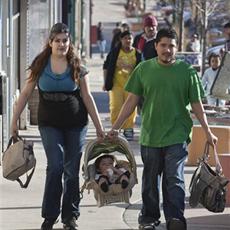
BARBARA KLEIN: Welcome to THIS IS AMERICA in VOA Special English. I'm Barbara Klein.
MARIO RITTER: And I'm Mario Ritter. This week on our program, we talk about the growth in the Hispanic population, America's largest minority group. We also tell you about calls for a national museum to honor their history and culture. And we find out why some retired Americans are buying homes in Mexico.
(MUSIC)
BARBARA KLEIN: More than 50 million people in the United States identified themselves as Hispanic or Latino in last year's national census. That was 16 percent of the population, or one out of six people.
The 2010 census defined "Hispanic or Latino" as a person of Cuban, Mexican, Puerto Rican, South or Central American or other Spanish culture or origin regardless of race.
The Census Bureau recently published a detailed report on the Hispanic population of the United States based on the new findings. The population is growing at an even faster rate than many experts had predicted.
MARIO RITTER: There were 35 million Hispanics, or 13 percent of the nation, in the last census in 2000. The Hispanic population grew by more than 40 percent between 2000 and 2010.
During that period, Hispanic growth represented more than half of America's total population increase. The Hispanic population grew four times faster than the nation as a whole.
Experts at the Census Bureau estimate that more than 60 percent of Hispanic growth was from "natural increase" rather than migration. Natural increase is the term for the number of births minus the number of deaths.

More than half of all Hispanics in the United States live in just three states: California, Texas and Florida. But the latest findings show how the Hispanic population is spreading out across the country.
Patricia Foxen is the associate director of research at the National Council of La Raza. She said there are a few main reasons for the spreading of the Latino population.
PATRICIA FOXEN: "The number one reason is probably jobs. There are certain industries that have gotten saturated. People go where the jobs are. There are also a couple of other things going on that shouldn't be minimized. You also have questions like cost of living and quality of life."
BARBARA KLEIN: The Census Bureau says the Hispanic population grew more than expected in 40 of the 50 states. Southern states had the largest increases. These states, including Alabama and North Carolina, traditionally have not had large Hispanic communities.
About three-fourths of Hispanics in last year's census identified themselves as being of Mexican, Cuban or Puerto Rican origin.
People of Mexican origin represented about three-fourths of the increase in the Hispanic population since 2000. There are now about 32 million people of Mexican origin in the United States. Puerto Ricans were the second largest group, at nearly five million.
People of Mexican origin represented the largest Hispanic group in 40 states last year. More of half of those states are in the South and West. Mexicans were also the largest group in the Midwest and in two states in the Northeast.
Puerto Ricans were the largest group in most of the Northeast and in one Western state, Hawaii. Dominicans were the largest group in one northeastern state, Rhode Island.
In the South, Cubans were the largest Hispanic origin group in Florida. Salvadorans were the largest group in Maryland and the District of Columbia.
MARIO RITTER: The Census Bureau first reported in 2003 that Hispanics outnumbered blacks, formerly the nation's largest minority. Last year, just over 12.5 percent of people identified themselves as black or African-American alone.
About five percent of people in the United States identified themselves as Asian and no other race. Compared to 2000, there was a 46 percent increase in people who described themselves as Asian alone or mixed race. That was more than any other major race group.
By some estimates, non-Hispanic whites will become a minority in the United States in about 30 years. In some states, non-Hispanic whites already are a minority, including Texas, California, New Mexico and Hawaii.
BARBARA KLEIN: Census results have important political effects. Every ten years, states use the population numbers to redraw the maps of legislative areas. The process is called redistricting, and it includes congressional districts in the House of Representatives.
(MUSIC)
MARIO RITTER: A federal commission is urging Congress to establish a national museum to recognize the history and success of Latinos.
The museums of the Smithsonian Institution in Washington already include the National Museum of the American Indian. A National Museum of African American History and Culture is expected to open in four years.
There are museums throughout the country that display Latino culture. But supporters say it is important for the country's largest minority group to have a national museum in the nation's capital. The commission included actress Eva Longoria and other celebrities. The group spent a year asking Latinos what they would want to see in a museum of their own.
We asked some visitors to Washington what they thought of the idea.
Chris Peek and his family are from Louisville, Kentucky.
CHRIS PEEK: "It's part of the melting pot. It's part of American culture and history."
John Carreiro and his wife, Sally, live in Southern California.
JOHN CARREIRO: "In about ten years the Latinos are going to mean a whole lot for voting and everything in this country. I would love to see one. And especially people from this part of the United States, because where we're from in California, it's probably 50 percent Latino at this time. I think people here would love to see that."
Maxine lives in Maryland.
MAXINE: "I think you should represent everybody you know, why just a few groups? Everybody should be represented."
Maxine's friend Carol Bradwell lives and works in Washington.
CAROL BRADWELL: "Sure, I'd go. Especially since Smithsonians are free and people come from all over the world just to visit here. Why not build something good?"
(MUSIC)
BARBARA KLEIN: Some retired Americans looking to save money are moving south to Mexico. Among them are Michael Baldwin and Stephanie Villareal. They spoke with VOA on Skype recently from their home on Mexico's Baja peninsula.
MICHAEL BALDWIN: "We have been here almost a year now. We moved from Houston, Texas. We came down temporarily last summer and made the decision to make it permanent, and we actually drove from Houston to Cabo San Lucas."
MARIO RITTER: Mr. Baldwin says they love the natural beauty and weather of Mexico. They also love the savings.
MICHAEL BALDWIN: "Houston versus Cabo, our expenses have been reduced by about 30 percent."
Stephanie Villareal says they have enjoyed getting to know people in their new community.
STEPHANIE VILLAREAL: "We have lots of friends, they are very welcoming, and this is one of our favorite parts of living here, the people."
BARBARA KLEIN: One thing they have noticed very little of, she says, is crime. In the past five years, an estimated 40,000 people have been killed in drug-related violence in Mexico. The Mexican government has been fighting powerful drug groups, and these cartels have also been fighting each other.
But Rodolfo Lopez-Negrete says there are still many areas untouched by the crime and violence of the drug trade. Mr. Lopez-Negrete is the chief operating officer of Mexico's Tourism Board.
RODOLFO LOPEZ-NEGRETE: "Out of the 2,500 municipalities we have in Mexico, the equivalent of your counties in America, 80 of those have witnessed episodes of violence."
He says American citizens living in the main resort areas of Mexico provide their own vote of confidence.
RODOLFO LOPEZ-NEGRETE: "In the major time-share developments, the major fractional developments or full ownership, more than half of those purchases are from Americans."
MARIO RITTER: In Houston, Chris Hill works with an industry group called the Mexico Real Estate Coalition. Mr. Hill says activity has slowed in the past few years, partly because of the recession, but also because of the violence. But he points out that the violence in the news is generally not near areas that are popular with foreigners.
CHRIS HILL: "All of these crime-related stories that we are hearing, drug-related, they have very little impact on a tourist or someone going to live in Mexico."
Americans who want to buy a home in Mexico might also have another security concern. It involves the security of their investment. Mexico's constitution bars foreigners from owning property within 50 kilometers of the coast. But foreigners can buy part of a Mexican real estate trust. Through these trusts, Americans can own a beach home indirectly.
Chris Hill says new legal guarantees make real estate investment in Mexico safer and easier than in the past.
CHRIS HILL: "We believe that, long term, Mexico is going to be a wonderful opportunity for retirees to live, the cost of medical services and health-related issues, but also the overall cost of living in Mexico is far lower."
(MUSIC)
BARBARA KLEIN: Our program was written and produced by Brianna Blake with Greg Flakus. I'm Barbara Klein.
MARIO RITTER: And I'm Mario Ritter. You can watch a video about Americans living in Mexico at voaspecialenglish.com. You can also find transcripts, MP3s and podcasts of our programs. Join us again next week for THIS IS AMERICA in VOA Special English.
Future US senior citizens face big changes
Awards ceremony to mark hispanic heritage month in US
Mexican-American artist brings immigrant experience out of shadows
Policies, politics and dollars rest on US census
(来源:VOA 编辑:崔旭燕)
